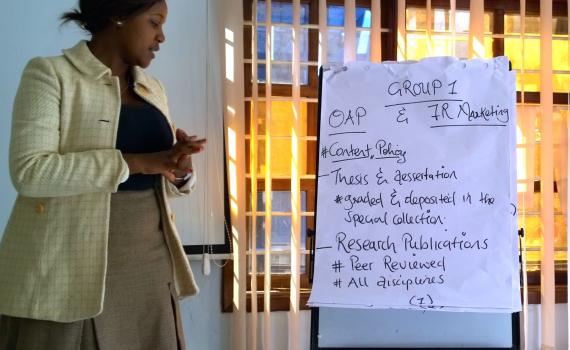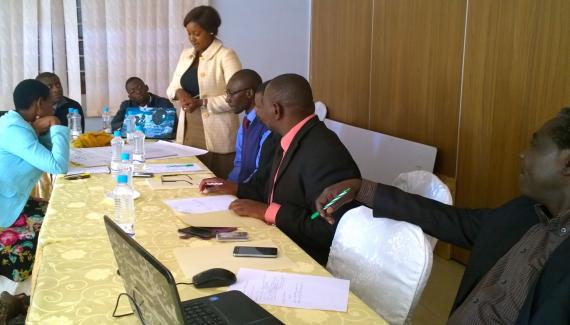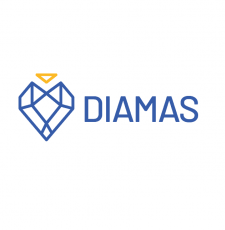
Zambia Library Consortium (ZALICO) has launched a national open access (OA) advocacy project that aims to transform Zambia’s research landscape.
The project is supported by EIFL, and aims to encourage OA uptake through advocacy, OA policy formulation, and to increase OA publishing in order to improve accessibility and visibility of research.
During events to launch the advocacy project (a series of three-day workshops held on 10-12 June), it became clear that there has been great progress with respect to OA in Zambia, but there is still work to be done to embed OA in research processes.
I was happy to take part in the workshops, and to share ideas with over 50 research managers, researchers and lecturers from six ZALICO member institutions.
TOP UNIVERSITIES AND RESEARCH INSTITUTES TAKE PART
The ZALICO advocacy project aims to increase take-up of OA practices. Six institutions - including the country’s top universities and research institutes, are taking part in the project: University of Zambia (UNZA); University of Lusaka (UniLus); National Institute for Public Administration (NIPA); Evelyn Hone College of Applied Arts and Commerce; Copperbelt University (CBU), and National Science and Technology Council (NSTC).
All were represented at the workshops. Over the three days, they discussed the role of OA in research; how to design effective OA policies, and current copyright trends in relation to OA.
They planned OA advocacy activities that will be led by OA champions, and use radio, social media and other communications channels to raise awareness about and advocate for OA.
STUDENTS ADVOCATE FOR OPEN ACCESS
ZALICO has formed a students’ OA advocacy team comprising 15 student leaders, who have already distributed over 200 OA fliers explaining the benefits of OA to the student community.
“I learnt a lot and want to continue with OA advocacy. Working hand-in-hand with librarians we have created a programme to promote OA and improve the use of the OA repository at our institution,” said Annestus M. Nchimunya, a student leader at UNZA.
“Starting this year, we are preparing for intensive orientation of first-year students who will be using our OA institutional repository. We will set up a table during orientation and will make use of our university radio station. We will be printing OA t-shirts and preparing other promotional materials,” he said.
OPEN ACCESS AT UNIVERSITY OF ZAMBIA (UNZA)
 UNZA has planned some ambitious OA goals and targets for the project.
UNZA has planned some ambitious OA goals and targets for the project.
They plan to formulate and adopt an OA policy and to improve the UNZA OA research repository.
The repository, UNZA Research Repository Online, currently includes 3,584 research outputs: PhD theses, master’s dissertations and undergraduate student reports from UNZA’s nine faculties and two institutes. UNZA plans to increase this to 4,000 by December 2015, and to include other types of research output, such as journal articles, university publications, conference papers, audio-visual materials and maps.
In addition, the university will upgrade their DSpace from version 1.4 to 5.2.
The repository has already played an important role in Zambian research. According to Nkatya Chikwekwe, a repository manager, UNZA’s OA repository had succeeded in providing a platform for further research, because researchers and students now had online access to theses and dissertations.
The repository had boosted UNZA’s ranking in the Webometrics Ranking of World Universities - Africa: in 2015, the university moved up from position 68 to 32 in the Webometrics Ranking of World Universities, he added.
OPEN ACCESS AT COPPERBELT UNIVERSITY
Since 2008, Copperbelt University (CBU) Library has been a leader in promoting OA in Zambia.
“The library has been advocating for OA at different fora, including School Boards of Studies, during information literacy sessions, and importantly, in individual user-librarian interactions,” said Augustine K. Mwamba, CBU Systems Librarian.
“The University Administration has taken steps to implement OA by including it in the CBU Strategic Plan 2009–2015. In 2010 the library made arrangements to implement the institutional repository, and in 2011 CBU established a working OA institutional repository that is now being strengthened,” Mwamba continued.
The repository currently includes over 160 PhD dissertations and is growing. As part of the OA advocacy project the university is drafting an OA mandate, and when it is adopted, academic staff will deposit their research and other publications in the OA institutional repository.
“The repository would consequently be able to show how much research the institution is conducting, and in which areas we are strong. Outside institutions, including government agencies, would then be able to understand the institutional capability,” Mwamba explained.
THE ZAMBIA SCIENCE AND TECHNOLOGY INFORMATION NETWORK (ZaSTIN)
(nstc.org.zm/about-zastin) The National Science and Technology Council (NSTC) has launched a web portal, ZaSTIN, to make science and technology research information accessible in one place.
Six institutions are currently part of ZaSTIN during its pilot phase. The network will soon be extended to include all science and technology institutions in the country.
STRONG FOUNDATIONS
The Zambian scholarly and research community brings valuable research and active OA repositories to the ZALICO project. There are sound plans to improve and extend OA repositories, and policy formulation is under way.
The launch events created good energy and commitment to going forward. The new OA champions have a strong foundation for their awareness raising campaigns.
Iryna Kuchma is the Open Access Programme Manager for EIFL.
The Zambia Library Consortium (ZALICO) is an EIFL partner in Zambia. In May 2015, EIFL supported a six-month project with ZALICO that will advocate for OA publishing and sharing in Zambia.
SHARE / PRINT








